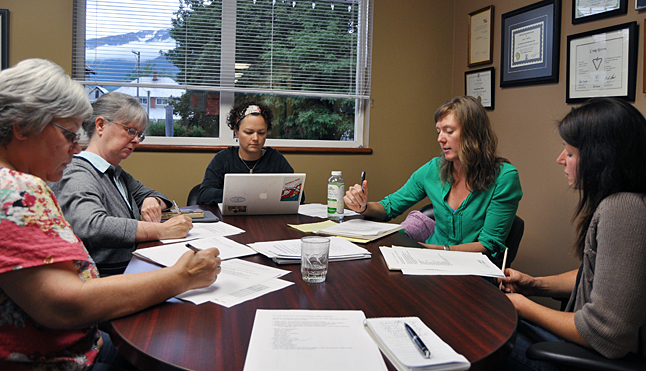
By David F. Rooney
Given Revelstokians’ deep and abiding interest in the security, availability and quality of food in our community it was only a matter of time before someone proposed a Food Charter for our city.
Towards that end, Hailey Ross and Melissa Hemphill of the North Columbia Environmental Society, Patti Larson of the Community Connections Food Bank, City Councillor Linda Nixon and organic farmer Tara Park of Terra Firma Farms recently sat down to begin the months-long process of hammering out a charter.
But what, you ask, is a Food Charter?
A Food Charter is a generally agreed upon statement of principles and beliefs about food quality, availability, sustainability, quality and security. It is not a legally binding document but it does encourage communities to think about and discuss food issues. (Click here to read a handy definition by Barbara Joughin of the Vancouver Food Policy Council.)
Kelowna, Abbotsford and many other communities across Canada have established food charters. In general they:
- Encourage systems of production, processing, distribution, consumption and recycling that protect our natural resources;
- Support local agriculture and food production systems that supply fresh, nutritious food to the region’s residents on a sustainable basis, balancing fair international agricultural trade and diverse vibrant production for the local market;
- Provide safe, sufficient, culturally acceptable and nutritious food to all residents;
- Respect food as a basic human right in which access to safe and nutritious food is not limited by economic status, location or other factors beyond a resident’s control; and they
- Ensure all residents have the information and skills necessary to achieve nutritional wellbeing.
It’s probably fair to say that most people in Revelstoke are affluent enough that they don’t worry about where their next meal is coming from. However, some of those people may still eat poorly because they devour too many processed or fast foods or, for one reason or another, don’t consume as much fruit or vegetables as they should. And, of course, we all know there are families in economic crisis who are very anxious about ways to feed themselves and their children. They depend on the Food Bank, skip meals and rely on cheap canned and other processed foods to stretch their meager pocketbooks.
“A Food Charter is a concept that speaks to community resiliency and sort of speaks to the need for sustainability,” Ross said at the first meeting of the ad hoc Food Charter Committee, which met for first time on June 27.
She said a charter creates a framework for discussion and decision at the local government level. The process of charter creation is very important in developing a food resiliency network, she said.
Each of the other women on the committee comes to the table with a set of priorities.
Tara Park has a certified organic farm south of the City. She started out selling produce at the weekly Farmer’s Market and has now landed a contract to sell her organic produce through Cooper’s Foods. She is also a director of the Certified Organic Association of British Columbia
She believes organic food is healthier than the heavily sprayed alternatives. Tara is also interested in the concept of community farming. (Click here and here to find out more about that very interesting concept.) Revelstoke, of course, has a community garden and community farming is like that ‘though on a much larger scale.
Patti needs almost no introduction. The long-time manager of the Community Connections Food Bank, she is deeply concerned about food insecurity and wants to “secure the future of the Food Bank.” She would like to see the Food Bank dismantled but recognizes that will likely never happen as food insecurity is an established fact of Canadian life. The number of people who absolutely rely on the Food Bank is increasing and she is always looking for ways to improve its offerings to its clients. From time to time Community Connections offers cooking classes for adult clients who don’t know how. It also partners with Bear Aware to collect and distribute fresh, surplus fruit. As a side note, Patti’s ancestors were local farmers
Melissa Hemphill leads the NCES’s very popular Local Food Initiative.
“I know a lot about the problems of conventional food production,” she said. “I’m also concerned about the disconnect young people and children have with real food — not food products.”
As a nurse, City Councillor Linda Nixon recognizes that access to good food is essential for a healthy community. She regards good quality food as essential to the healing process and sees food security as a vital part of the health of a community as well as that if individuals.
“I didn’t grow up on a farm, but we had a large garden when I was growing up and my dad was a hunter so we always had game,” she said. “We knew where the food we ate came from.”
The committee recognizes that it needs a broad base of support and will be reaching out to different individuals and stakeholder groups — such as seniors, youths, School District 19, City Hall, and the local retail food market — in the community as it works to create a Food Charter for Revelstoke. Ideally it would like to have this project wrapped up by early winter.
We’ll all be learning — and discussing — more about food in the months ahead. Stay tuned and please participate in the community dialogue on this issue.
In the meanwhile, here are links to additional resources:
http://www.ryerson.ca/foodsecurity/definition/#
http://www.ecoliteracy.org/essays/food-security-it-takes-community
http://www.foodconnections.ca/images/pdf/food%20charter.pdf



